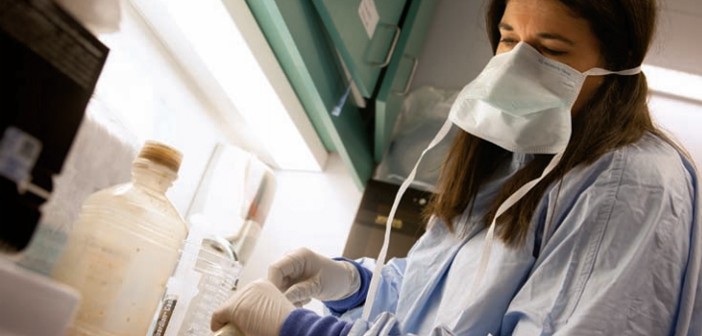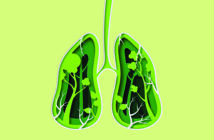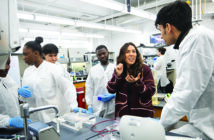Are fecal transplants the answer to C. diff infection?
Colleen Kelly, MD RES ’06, clinical assistant professor of medicine and a gastroenterologist at the Women’s Medicine Collaborative in Providence, is a leading expert in fecal microbiota transplants (FMT) to treat recurrent Clostridium difficileinfection, which infects as many as 3 million patients each year in the US—and kills about 50,000 of them. These infections are caused by antibiotics and are becoming more resistant to routine therapy.
Kelly has treated more than 140 patients with FMT and is the principal investigator for an NIH-funded randomized controlled clinical trial for the treatment of relapsing C. difficile infection. FMT involves transferring the “good” microorganisms from a healthy donor into a patient with C. diff infection. These bacteria then begin to grow in the patient’s colon and prevent C. diff from overgrowing again. Published data suggest the therapy is up to 94 percent effective.
Why is toxigenic C. difficile dangerous? How do antibiotics cause this?
C. difficile infection can range from mild diarrhea to severe. At its worst, C. diff can present with severe systemic toxicity including shock, multisystem organ failure, lactic acidosis, and even result in death. Antibiotics cause damage to the “good bacteria”—the healthy communities of anaerobes that are normally dominant in a healthy colon. These anaerobes normally limit the growth and expansion of C. diff. When they are wiped out by antibiotics,C. diff can proliferate, produce toxin, and result in disease
How did your research begin?
I started doing fecal transplants because I had a patient with recurrent C. difficile who was not getting better after six months of standard therapies. It seemed logical and safe, and it was her only option. When it worked, I was referred a few more patients from Boston, where they were not yet doing fecal transplants. It was effective in every one of them. After about a year, I wondered why everybody wasn’t doing it. That led me to designing a study, applying for funding through NIH, and securing an IND [Investigational New Drug] status from the FDA. The FDA considers fecal transplant a “drug” and a “biologic” and requires an application, just as they would from a pharmaceutical company seeking to test a new drug. I started a randomized double-blind clinical trial in 2012 and we should be completing enrollment sometime this summer.
Were you nervous when you treated your first patient and implanted screened stool from a healthy donor into her via a colonoscope?
Very. I wasn’t sure exactly how to do it, whether it would work, whether I could cause an infection. I read everything I could find, talked to doctors who had done it, and became more convinced about the safety. In more than 50 years of fecal transplants, there haven’t been any reports of infections transmitted. With the first patient I was just worried it wouldn’t work. I didn’t know what else I could do for her.
Who have been more squeamish, patients or physicians?
Definitely the physicians. These patients are suffering and willing to do anything to get better. They have read all about fecal transplant online and seek out a provider willing to do it for them.
Our bodies are packed with microbial communities living on and in us. Your work seems to underscore how dependent we are on these organisms. Why?
These organisms have important roles in digestion, energy metabolism, vitamin production, and immune system development. They also help protect us from getting sick. We now are learning what genes these bacteria carry and what they are doing. There are a number of diseases such as inflammatory bowel disease, obesity, fatty liver disease, and autoimmune allergic conditions that are associated with gastrointestinal dysbiosis [alterations in bacterial populations in our guts]. We hope to eventually figure out whether therapeutic manipulation of these bacteria can be beneficial in some of these other conditions.
You and your husband, Assistant Professor of Medicine Matthew Jankowich, MD F’07, are raising three children (Alex, 9; Carrie, 9; and Catherine, 5). How do you have the energy to do all that you do?
I am a born worker. My parents were both blue collar and worked very hard. They instilled that ethic in us. My first job was a paper girl in sixth grade for the Cleveland Plain Dealer. My parents warned me that if I took the job I had to keep it for at least one year. I had to get up every morning at 5. It was dark and cold and I was lugging around all these heavy papers and I hated it after about three days. But they made me do it
for a whole year; I was not allowed to quit. So quitting or giving up was never an option with any of this. From writing the NIH grant to getting an IND from the FDA, it took hundreds of hours. Yes, I would often feel a little tired or overwhelmed or sorry for myself, but I just kept plugging away because I believe nothing of value in life comes easily
You have saved many thank-you letters from patients. What do these mean to you?
When I’m feeling really tired or frustrated about something, I look at them and remember how much this work is helping people and making a difference. They mean a lot to me. They make me smile and sometimes almost cry. They are so heartfelt. It feels good that all this work is so appreciated.
What is your message to physicians and dentists who prescribe antibiotics?
Carefully consider every course of antibiotics that you prescribe. I’ve seen people die of C. diff that resulted from courses of unnecessary antibiotics. The antibiotics you prescribe do a lot of collateral damage. We need to preserve the ecosystem that is our gut microbiome. Use the most narrow spectrum antibiotic you can and avoid clindamycin. It should have a skull and crossbones on the bottle.




